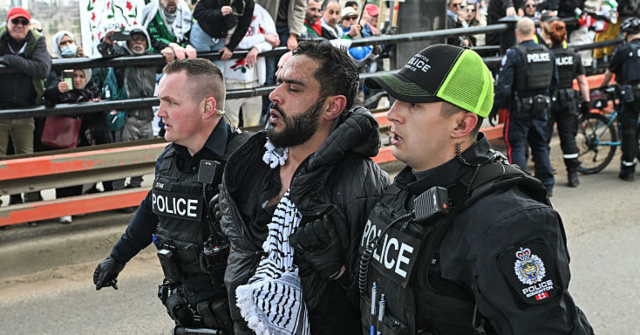A group of 599 foreign nationals with criminal records that Canada’s Border Services Agency (CBSA) intended to deport “have gone missing,” the Globe and Mail revealed in a shocking report on Tuesday.
An expert speaking to the Canadian newspaper observed that the nation’s border officials had failed “for decades” to apprehend and deport some foreign citizens with criminal records. Even detaining individuals identified as “high-risk” foreign nationals before deporting them has become a struggle for Ottawa, the report explained, as immigrant rights’ groups denounced law enforcement actions to protect the domestic population from foreign criminals.
Canada experienced a dramatic surge in its foreign-born population during the decade that former Liberal Prime Minister Justin Trudeau held office, who greatly facilitated international travel and immigration to the country. The policy led to a significant increase in the foreign-born population, particularly that of foreign-born males of employment age, which also fed a growing housing and job crisis. Towards the end of his term in 2014, before announcing that he would resign from his post as head of government, Trudeau promised to dramatically reduce rates of immigration to the country, claiming it was “not fair” for Canadians to have to compete for homes and jobs with a booming foreign-born population.
Trudeau was succeeded by his hand-picked successor Mark Carney, a finance expert with no political experience who trounced longtime Conservative Party leader Pierre Poilievre in an election where Liberals had trailed by up to 26 points in some polls. Carney is promoting the passage of a bill to address the mass migration during the past decade, called the “Strong Borders Act,” which leftist groups condemned as putting too many onerous requirements on migrants and appearing to make concessions to improve relations with President Donald Trump. Trump has cited Canada’s lax border enforcement as one of many reasons to impose tariffs on its exports to America.
The CBSA’s attempts to address foreign citizens identified as having committed crimes in Canada with the intent to deport them have failed to detain, or even locate, hundreds of people, the Globe and Mail detailed.
“Figures from the Canada Border Services Agency show that 1,635 foreign nationals guilty of committing crimes in Canada are currently facing deportation,” the newspaper relayed, “but 599 of them have failed to attend deportation proceedings and have been placed on the agency’s ‘wanted’ list.”
“Of those 599, 315 have been evading deportation for more than three years,” it added.
The newspaper identified 431 of the missing 599 as being “found guilty of serious crimes such as sexual assault.” Many have been missing for years.
Speaking to the Toronto Sun, an unnamed Canadian border agent lamented that part of the reason for Canadian authorities failing to keep tabs on known criminal foreigners was pressure from the Trudeau administration simply not to enforce immigration laws.
“Justin Trudeau and his gang of woke idiots thought the list was mean and racist,” the anonymous CBSA official allegedly said. “That list was working. Now? No one gets detained. It’s f—ing ridiculous.”
The Sun reported that, currently, “There are around 400,000 people awaiting deportation, 30,000 of whom were inadmissible in the first place.”
Immigration lawyer Randy Hahn told the Globe and Mail that some of the cases of foreign nationals with criminal records must be decades old given the age of the laws they violated.
The revelation that hundreds of foreign nationals guilty of crime in Canada are unaccounted for follows the confirmation in early July by Immigration, Refugees and Citizenship Canada (IRCC) that the government also “rehabilitated” over 17,000 foreigners with criminal records.
“From 2014 to 2024, more than 25,350 foreigners submitted an application to have their criminal record forgiven so they can enter Canada, whether on a work or study visa, to apply for permanent residency, or for a short-term visit,” CTV revealed at the time. “Of those, nearly 70 per cent were approved, nearly 20 per cent were refused, and about 10 per cent of applications were withdrawn.”
A spokesperson for the agency, Remi Lariviere, told CTV that those “rehabilitated” and allowed into Canada had to “demonstrate they have been rehabilitated and do not pose a risk to Canadian society.”
“Rehabilitation has been a longstanding practice, with provisions that have been outlined in the Immigration and Refugee Protection Act (IRPA) since 2001, more specifically under paragraph 36(3)(c),” Lariviere insisted in a message to the network. “This is not about ‘forgiving’ crimes. These provisions are applied cautiously, and on a case-by-case basis.”
The CBSA announced on Wednesday that it had begun using a new temporary facility in Quebec to house “high-risk detainees,” noting that the facility can only house “up to 25 adult male detainees” who pose a danger to others.
“Following an individual risk assessment, detainees placed at the designated immigrant station may have prior convictions or outstanding charges for violent crimes,” the agency explained, “such as assault with a weapon, attempted murder, assaulting an officer with a weapon, and aggravated sexual assault,” among other crimes.
Follow Frances Martel on Facebook and Twitter.
Read the full article here


